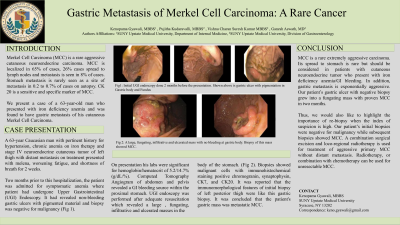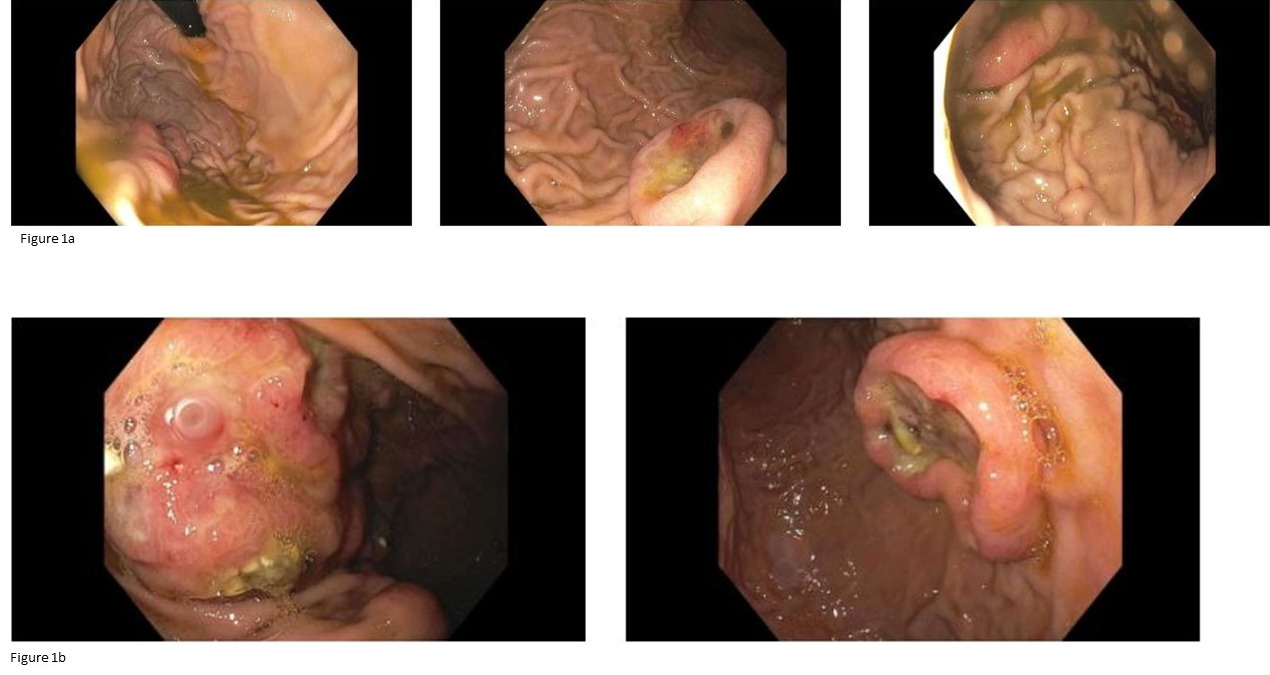Back


Poster Session A - Sunday Afternoon
Category: Stomach
A0729 - Gastric Metastasis of Merkel Cell Carcinoma: A Rare Cancer
Sunday, October 23, 2022
5:00 PM – 7:00 PM ET
Location: Crown Ballroom

Has Audio

Kenopama Gyawali, MBBS
SUNY Upstate Medical University
Syracuse, NY
Presenting Author(s)
Award: Presidential Poster Award
Kenopama Gyawali, MBBS1, Pujitha Kudaravalli, MBBS2, Vishnu Kumar, MD1, Ganesh Aswath, MD2
1SUNY Upstate Medical University, Syracuse, NY; 2State University of New York Upstate University Hospital, Syracuse, NY
Introduction: Merkel Cell Carcinoma (MCC) is a rare aggressive cutaneous neuroendocrine carcinoma. MCC is localized in 65% of cases, 26% cases spread to lymph nodes and metastasis is seen in 8% of cases. Stomach metastasis is rare site of metastasis, seen in 0.2 to 0.7% of cases on autopsy. CK 20 is a sensitive and specific marker of MCC. We present a case of a 63-year-old man who presented with chronic anemia and was found to have gastric metastasis of his cutaneous Merkel Cell Carcinoma.
Case Description/Methods: A 63-year Caucasian man with pertinent history for hypertension, chronic anemia on iron therapy and stage IV neuroendocrine cutaneous tumor of left thigh with distant metastasis on treatment presented with melena, worsening fatigue, and shortness of breath for 2 weeks. Two months prior to this hospitalization, the patient was admitted for symptomatic anemia where patient had undergone Upper Gastrointestinal (UGI) Endoscopy. It had revealed non-bleeding gastric ulcers with pigmented material and biopsy was negative for malignancy (Fig 1a). On presentation his labs were significant for hemoglobin/hematocrit of 5.2/14.7% (g/dL/%). Computed Tomography Angiogram of abdomen and pelvis revealed a GI bleeding source within the proximal stomach. UGI endoscopy was performed after adequate resuscitation which revealed a large, fungating, infiltrative and ulcerated masses in the body of the stomach. (Fig 1b). Biopsies showed malignant cells with immunohistochemical staining positive for chromogranin, synaptophysin, CK7, and CK20. It was reported that the immunomorphological features of initial biopsy of left posterior thigh were like this gastric biopsy. It was concluded that the patient's gastric mass was metastatic MCC.
Discussion: MCC is a rare extremely aggressive carcinoma. Its spread to stomach is rare but should be considered in patients with cutaneous neuroendocrine tumor who present with iron deficiency anemia/GI bleeding. In addition, gastric metastasis is exponentially aggressive. Our patient’s gastric ulcer with negative biopsy grew into a fungating mass with proven MCC in two months. Thus, we would also like to highlight the importance of re-biopsy when the index of suspicion is high. Our patient’s initial biopsies were negative for malignancy while subsequent biopsies showed MCC. A combination surgical excision and loco-regional radiotherapy is used for treatment of aggressive primary MCC without distant metastasis. Radiotherapy, or combination with chemotherapy can be used for unresectable MCC.

Disclosures:
Kenopama Gyawali, MBBS1, Pujitha Kudaravalli, MBBS2, Vishnu Kumar, MD1, Ganesh Aswath, MD2. A0729 - Gastric Metastasis of Merkel Cell Carcinoma: A Rare Cancer, ACG 2022 Annual Scientific Meeting Abstracts. Charlotte, NC: American College of Gastroenterology.
Kenopama Gyawali, MBBS1, Pujitha Kudaravalli, MBBS2, Vishnu Kumar, MD1, Ganesh Aswath, MD2
1SUNY Upstate Medical University, Syracuse, NY; 2State University of New York Upstate University Hospital, Syracuse, NY
Introduction: Merkel Cell Carcinoma (MCC) is a rare aggressive cutaneous neuroendocrine carcinoma. MCC is localized in 65% of cases, 26% cases spread to lymph nodes and metastasis is seen in 8% of cases. Stomach metastasis is rare site of metastasis, seen in 0.2 to 0.7% of cases on autopsy. CK 20 is a sensitive and specific marker of MCC. We present a case of a 63-year-old man who presented with chronic anemia and was found to have gastric metastasis of his cutaneous Merkel Cell Carcinoma.
Case Description/Methods: A 63-year Caucasian man with pertinent history for hypertension, chronic anemia on iron therapy and stage IV neuroendocrine cutaneous tumor of left thigh with distant metastasis on treatment presented with melena, worsening fatigue, and shortness of breath for 2 weeks. Two months prior to this hospitalization, the patient was admitted for symptomatic anemia where patient had undergone Upper Gastrointestinal (UGI) Endoscopy. It had revealed non-bleeding gastric ulcers with pigmented material and biopsy was negative for malignancy (Fig 1a). On presentation his labs were significant for hemoglobin/hematocrit of 5.2/14.7% (g/dL/%). Computed Tomography Angiogram of abdomen and pelvis revealed a GI bleeding source within the proximal stomach. UGI endoscopy was performed after adequate resuscitation which revealed a large, fungating, infiltrative and ulcerated masses in the body of the stomach. (Fig 1b). Biopsies showed malignant cells with immunohistochemical staining positive for chromogranin, synaptophysin, CK7, and CK20. It was reported that the immunomorphological features of initial biopsy of left posterior thigh were like this gastric biopsy. It was concluded that the patient's gastric mass was metastatic MCC.
Discussion: MCC is a rare extremely aggressive carcinoma. Its spread to stomach is rare but should be considered in patients with cutaneous neuroendocrine tumor who present with iron deficiency anemia/GI bleeding. In addition, gastric metastasis is exponentially aggressive. Our patient’s gastric ulcer with negative biopsy grew into a fungating mass with proven MCC in two months. Thus, we would also like to highlight the importance of re-biopsy when the index of suspicion is high. Our patient’s initial biopsies were negative for malignancy while subsequent biopsies showed MCC. A combination surgical excision and loco-regional radiotherapy is used for treatment of aggressive primary MCC without distant metastasis. Radiotherapy, or combination with chemotherapy can be used for unresectable MCC.

Figure: Fig1a: Initial UGI endoscopy done 2 months before the presentation. Shown above is gastric ulcer with pigmentation in Gastric body and Fundus
Fig 1b: A large, fungating, infiltrative and ulcerated mass with no bleeding at gastric body. Biopsy of this mass showed MCC.
Fig 1b: A large, fungating, infiltrative and ulcerated mass with no bleeding at gastric body. Biopsy of this mass showed MCC.
Disclosures:
Kenopama Gyawali indicated no relevant financial relationships.
Pujitha Kudaravalli indicated no relevant financial relationships.
Vishnu Kumar indicated no relevant financial relationships.
Ganesh Aswath indicated no relevant financial relationships.
Kenopama Gyawali, MBBS1, Pujitha Kudaravalli, MBBS2, Vishnu Kumar, MD1, Ganesh Aswath, MD2. A0729 - Gastric Metastasis of Merkel Cell Carcinoma: A Rare Cancer, ACG 2022 Annual Scientific Meeting Abstracts. Charlotte, NC: American College of Gastroenterology.

